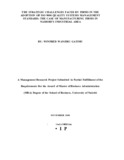| dc.description.abstract | The purpose of this study was to identify the strategic challenges that manufacturing
firms based in Nairobi’s Industrial Area are facing in the adoption of ISO 9001:2000.Out
of the companies sampled, four manufacturing companies responded constituting a 73%
response rate. The study was carried out by use of questionnaires, which consisted of
both open-ended and closed questions. The data collected was analyzed using the SPSS
computer based statistical program and presented in tables and other descriptive statistics.
The study shows that there are various strategic opportunities and challenges that
manufacturing firms are facing following their adoption of ISO 9001:2000.The major
opportunities identified are: increased efficiency and efficacy (27.5%), improved
international rating (17.7%), improved customer satisfaction (15.7%) and Quality
Monitoring improvement (13.7%).The major strategic challenges identified were:
increase in expenditure (33.4%), conformity of manufactured products to international
standards (17.7%), maintaining already set standards of operations following certification
(15.9%) and heavy and costly investment in IT and machinery (13.3%).
The conclusions drawn from the study were that firms that adopted ISO 9001:2000 were
firms that already had a quality system in place and therefore adoption of the standard
was to enable the firm strengthen and improve its already existing quality system. The
main reasons that motivated firms to adopt ISO 9001:2000 were identified as: to enable
firm gain competitive advantage mainly in overseas markets (10.7%), aid the firm in
increasing efficiency and productivity (13.4%), to play a role as part of the firm’s larger
6
improvement strategy (13.4%) and to enable the firm compete more effectively in
overseas markets (13.4%).
In order for the certified manufacturing firms to maximize on the opportunities and
minimize on the negative effects of the strategic challenges of adopting ISO 9001:2000
they would have to ensure that the certification is being obtained for the right reasons as
well as to sensitize employees as well as all other stakeholders to ensure that all are on
board prior and following certification to reduce negative effects of resistance. | en |

